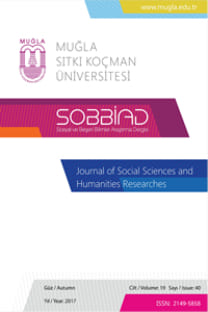OKUL YÖNETİCİLERİNİN MENTORLUK ROLLERİNİN OKULUN AKADEMİK BAŞARISI VE BAZI DEĞİŞKENLER AÇISINDAN İNCELENMESİ
Bu araştırmanın amacını, okul yöneticilerinin mentorluk rolleri ile okulun akademik başarısı arasındaki ilişkinin ve bazı değişkenler açısından mentorluk rollerinin incelenmesi oluşturmaktadır. İlişkisel tarama niteliğindeki bu araştırmanın çalışma grubunu 2011-2012 eğitim öğretim yılında Konya İli’nde Mili Eğitim Bakanlığına bağlı okullarda görev yapan 372 okul yöneticisi oluşturmaktadır. Araştırmanın verileri araştırmacı tarafından hazırlanan “Kişisel Bilgi Formu” ve Sezgin (2002) tarafından hazırlanan “Yetiştiricilik Ölçeği” kullanılarak toplanmıştır. Toplanan veriler üzerinde aritmetik ortalama, standart sapma, t testi, Pearson korelâsyonu, tek yönlü varyans analizi ve ANOVA gibi farklı çıkarımsal analizler yapılmıştır (p<0.05). Elde edilen sonuçlara göre okul yöneticilerinin mentorluk rolleri ile görev yaptıkları okulun akademik başarıları arasında pozitif yönlü anlamlı bir ilişki olduğu görülmüştür. Ayrıca okul yöneticilerinin mesleki sevgilerine ve görev yaptıkları okuldaki öğrenci sayısına göre mentorluk rollerinin anlamlı düzeyde farklılaştığı; mezun oldukları fakülteye göre ise anlamlı düzeyde farklılaşmadığı sonucuna ulaşılmıştır.
Anahtar Kelimeler:
Okul Yöneticisi, Akıl Hocalığı, Mentee, Mentor, Mentorluk
A Study on School Administrators’ Mentorship Roles in Terms of the Academic Achievement of Schools and Some Variables
The purpose of this study is to investigate the relationships between school administrators’ mentorship roles and academic achievement of schools and explore mentorship roles in terms of some variables. The research group of this study, which is of the relational screening model, consists of 372 school administrators who were employed in schools affiliated to the Ministry of National Education in the province of Konya in the 2011-2012 academic year. The research data were collected from the “Personal Information Form”, which was prepared by the researcher and the “Training Scale”, which was prepared by Sezgin (2002). Various inferential analyzes were conducted on the data such as arithmetic mean, standard deviation, t test, Pearson correlation, one way variance analysis and ANOVA (p<0.05). According to the results that were obtained, a positive and significant correlation was observed between the school administrators’ mentorship roles and the academic achievement of the schools where they worked. Moreover, it was concluded that their mentorship roles differed significantly according to the school administrators’ love for their profession and the number of students where they worked whereas there was no significant difference according the faculty from which they graduated.
Keywords:
School Administrator Mentee, Mentor, Mentorship, Coaching, Academic Achievement,
- ISSN: 2149-5858
- Yayın Aralığı: Yılda 2 Sayı
- Başlangıç: 2000
- Yayıncı: Mugla Sitki Kocman University
Sayıdaki Diğer Makaleler
ÜLKELER ARASI CO2 EMİSYONUN AZALTILMASI YÖNDE ETKİNLİK ÇALIŞMASI
SORUMLULUĞUN BAZI DEĞİŞKENLER AÇISINDAN DEĞERLENDİRİLMESİ
REJİMİN KORUYUCUSU: KARŞILAŞTIRMALI BİR PERSPEKTİFLE TÜRK ANAYASA MAHKEMESİ
Vahap AYDEMİR, Gözde Müşerref GEZGÜÇ
KÜRESELLEŞME ÇOKKÜLTÜRLÜLÜK VE İSLAM ( DİN SOSYOLOJİSİ VE ANTROPOLOJİSİ YAZILARI)
ETKİN ÇATIŞMA YÖNETİMİ VE AKADEMİSYENLERİN KARŞILAŞTIKLARI ÇATIŞMA NEDENLERİNE YÖNELİK BİR ARAŞTIRMA
İLÇELERİN TURİZM POTANSİYELLERİNİN ANALİTİK HİYERARŞİ YÖNTEMİ İLE SIRALANMASI: MUĞLA ÖRNEĞİ
Ercan BALDEMİR, Hande Akyurt KURNAZ
İç Kapak, Hakem Listesi, İçindekiler
Önceki Bölümlerin Özeti: … ya da Kahramanlık Olgusunun Dönüşümü
TURİZM ÖĞRENCİLERİNİN HER ŞEY DAHİL SİSTEMİNE YÖNELİK TUTUMLARI
